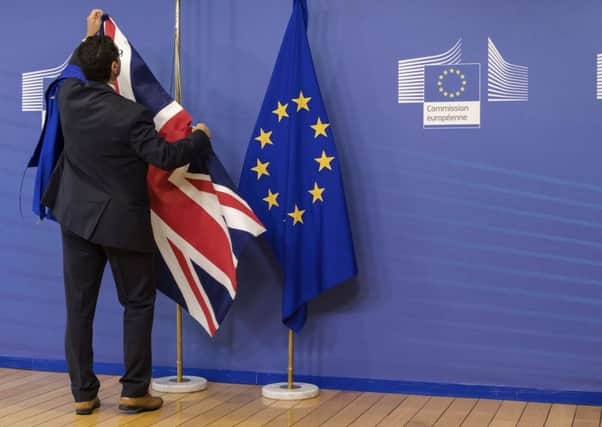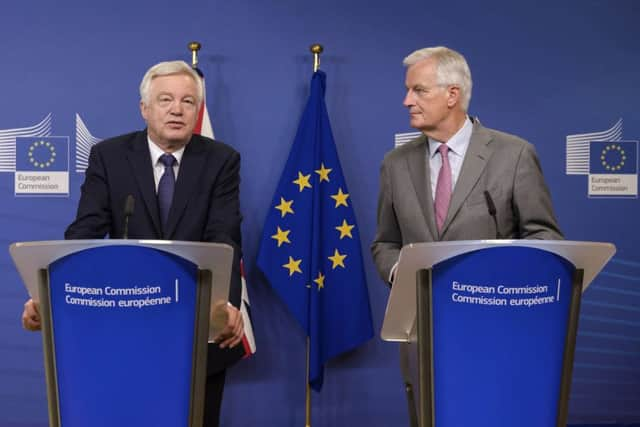Brexit talks finally '˜get to the heart of things'


As the first substantive negotiations in Brussels got under way yesterday, EU sources warned that the window for progress to be made was as little as two months to find compromises on crucial issues before the future economic relationship with the UK is discussed.
The UK government accepted EU demands that agreement is reached on three priorities of rights, money and Northern Ireland before any discussions are held on a crucial deal covering more than £550 billion worth of trade between the UK and EU.
Advertisement
Hide AdAdvertisement
Hide AdEuropean leaders have earmarked a European summit on 20 October for the leaders of 27 member states to review progress and decide whether negotiations can move to the next stage.


Ratification of the final Brexit deal by parliaments in 27 countries is expected to start in October 2018, leaving just a year to agree the outline of a trade deal and transitional arrangements to stop UK businesses falling off a Brexit “cliff edge”.
Week-long rounds of talks will be held in Brussels every four weeks until a final deadline under the formal Article 50 exit process on 29 March 2019.
Additional negotiation sessions could slotted in between now and October if more work is needed to close the gap between the two sides, The Scotsman understands.
There was a new sense of urgency from the UK Brexit Secretary David Davis as he made a flying visit to Brussels to meet his opposite number Michel Barnier and get talks under way.


“For us it is incredibly important that we now make good progress, that we negotiate through this and identify the differences so that we can deal with them, and identify the similarities so we can reinforce them,” he said at the European Commission headquarters. It’s time to get down to work and make this a successful negotiation.”
Mr Barnier said that talks would “now delve into the heart of the matter”, after a one-day initial session in June. “We need to examine and compare our respective positions in order to make good progress.”
The two men met one-on-one for 15 minutes before being joined by lead negotiators for almost an hour to plan the week ahead. Mr Davis then returned to London ahead of a knife-edge vote in the House of Commons.
Advertisement
Hide AdAdvertisement
Hide AdNegotiations will be carried out by a 98-strong UK negotiation team, which outnumbers the EU’s Brexit task force of 45 by more than two to one.
Discussions are taking place in working groups covering finance, citizens’ rights, and separation issues, while sensitive discussions starting today on Northern Ireland will be handled personally by Olly Robbins, the permanent secretary at the Department for Exiting the EU, and Sabine Weyand, the deputy chief EU negotiator.
A press conference is expected at the close of the current negotiation round on Thursday, although the UK officials indicated that was dependent on the amount of progress that is made.
Despite calls from Mr Barnier for the UK to make clear its position on payments to the EU, talks on a Brexit financial settlement began without a detailed UK paper on the issue.
Unofficial claims from the EU side of a bill between £60-£100 billion have been dismissed by the UK government. Last week Boris Johnson said the EU could “go whistle” for what he called an “exorbitant” sum. EU officials are reported to be under pressure not to discuss a firm figure until an accepted formula is agreed. UK negotiators are expected to spend this week going through the EU’s financial settlement position paper to query its methodology line-by-line.
The document lists 65 EU agencies and programmes where the UK has outstanding funding commitments under European law.
On citizens’ rights, negotiators must find a way to bridge a red line for both sides over the legal protections for EU nationals after Brexit.
The UK government insists that the Courts of Justice of the EU can no longer have any jurisdiction in the UK after Brexit, barring for a time-limited transition period, while the EU says it is the only body that can defend those rights.
Advertisement
Hide AdAdvertisement
Hide AdYesterday the Scottish Government called for clarity over the UK’s proposals on EU nationals living in the UK.
Ministers have published a response to the UK government’s plan, with Scottish Government Brexit minister Michael Russell saying a number of “essential issues” remain uncertain.
UK ministers have proposed that EU nationals resident in the UK will be able to apply for “settled status”, effectively guaranteeing them indefinite leave to remain in the country once Britain is out of the EU.
Any EU citizen who has been living in the UK continuously for five years will be eligible, while those who have been resident for less than five years will be also be allowed to stay to build up to five years.
Ministers have yet to confirm the cut-off date for qualification.
The Scottish Government said there are a number of important questions over “settled status”, including who will qualify, what rights they will be entitled to, the rules for family members and the costs of applying.
Mr Russell said: “As negotiations get under way again today in Brussels, it is important that this issue be concluded as soon as possible.
“Were Scotland part of the negotiating team, as we have suggested, we would be doing our best to help the UK resolve the matter and any thoughts we offer are given in that spirit.
Advertisement
Hide AdAdvertisement
Hide Ad“It is of course disappointing that it has taken the UK government a year to set out their plans but with good will on both sides the issues could be settled in the next few days.
“This issue is also of course about protecting the existing rights of Scots and other UK citizens living in other EU countries.”